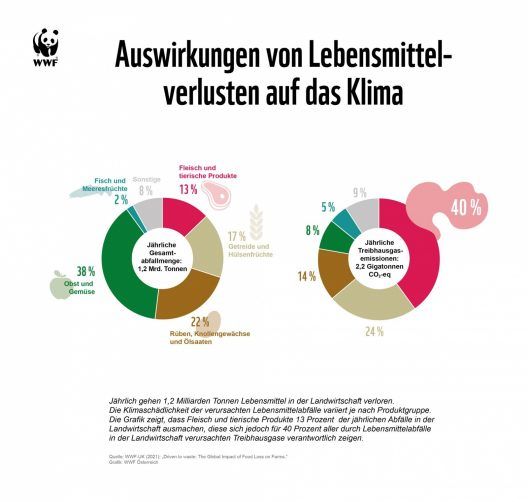WWF report: 40 percent of food produced worldwide is wasted
Advertisement
New figures show: food waste much greater than previously thought, massive burden on climate and environment - WWF calls for action plan to halve food losses by 2030.

by Lisa Gaugl WWF AT
A new report by the environmental protection organization WWF (World Wide Fund for Nature) shows the enormous extent of losses of valuable food: instead of the previously estimated 33 percent, 40 percent of the food produced is never eaten, according to the WWF report. The reason for the increase is new figures from the agricultural sector. According to the report, an estimated 1.2 billion tons of edible food are lost each year before, during and after harvesting alone. In addition to the roughly 931 million tons (FAO, 2021) along the supply chain and about 400 million in the consumption sector, that's a total of 2.5 billion tons of food waste that would actually be intended for consumption. Loaded on trucks, that would be a column that reaches twice to the moon and back. "These enormous losses show the special importance of the agricultural sector, which has been neglected so far - also in Austria. We must involve all sectors from the field to the plate. This is the only way we can stop the senseless waste of valuable resources and better protect the climate," says Olivia Herzog, food waste expert at WWF Austria, referring to the enormous impact of the losses: around four and a half million square kilometers, the area of the entire European Union, are unnecessarily used worldwide, while pressure on the climate and nature is increasing. According to the report, food waste is responsible for around ten percent of global greenhouse gas emissions - just under twice as much as the annual emissions of car traffic in the EU and the USA combined.
WWF Austria therefore calls for a comprehensive action plan against food waste with binding reduction targets and at least a halving of food waste and loss by 2030. In addition to a solid data basis for Austria, market restrictions for products such as fruit and vegetables must be adjusted. Farmers need fair trading conditions and opportunities to sell produce spontaneously and locally before it threatens to spoil.
Food waste fuels climate crisis
Fruits and vegetables, beets, tubers and oilseeds, as well as grains and legumes, are most likely to end up in the trash. But when animal products, such as meat or milk, are thrown away, it puts a particular strain on the climate - 40 percent of the climate gases from global losses in agriculture are attributable to products of animal origin. "Especially with resource-intensive products like meat, it is important that they do not end up in the trash. Treating food with respect can make an important contribution to climate protection and species conservation," says Herzog.
Of course, it is not the farmers who are primarily responsible for the losses in agriculture. According to the WWF, it is above all the politicians who are called upon to create framework conditions that save food. Consumers can also contribute by adapting their eating habits. "Not spurning foods with blemishes, an increased plant-based diet and high production standards contribute to a sustainable food system. A change in thinking is needed, namely in favor of our planet and the climate - politicians must take this responsibility seriously," demands WWF expert Olivia Herzog.





























































